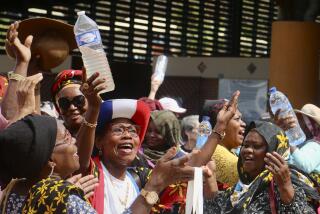No Escaping Budget Woes, Even in a Tropical Paradise : Seychelles: Debt-ridden government seeks ways to boost revenues from tuna and tourists.
- Share via
VICTORIA, Seychelles — Donald Hoffman angrily negotiated his cab around another bend in the mountain road leading through lush groves of coconut and banana trees.
“During the Gulf War, petrol went up twice and we were told it would drop after the war. But has it? No!
“Politicians are greedy, they want everything for themselves,” growled Hoffman, a descendant of German settlers.
To tourists, the Seychelles are an uncomplicated tropical paradise. But life isn’t so simple for the Seychellois, who have gone from dictatorship to democracy with a wobbling economy.
In the ‘70s and ‘80s, the 75,000 people who inhabit these coral-encrusted islands off Africa’s eastern coast endured 15 years of quasi-Marxist, one-party rule, when personal freedoms were severely curtailed.
The economy may not have improved since the restoration of multi-party democracy in 1992, but at least Seychellois now feel free to complain about the government’s performance.
Grappling with debt and desperate to bring in foreign currency, the government has taken a hatchet to the national budget for the second straight year, prompting fears of government layoffs and cuts in services.
The government blames its financial woes on dwindling tourism and inefficient production of tuna, the country’s two top foreign currency earners.
Tourism is one of the few departments to escape the ax in 1995. Tourist officials plan a campaign promoting the islands’ colorful Creole culture and spicy food, its exotic flora and fauna--including giant tortoises--and myriad water sports.
“People grumble, but we have to spend money to win tourists,” Tourism Minister Simone de Comarmond said in an interview at her office at Independence House, a modern cream-colored building on Victoria’s Independence Avenue. “Other countries are doing it and we must compete.”
The number of visitors this year is expected to be down 7% from 1993’s record of 116,000.
To squeeze more earnings out of tuna, the government plans to expand its fish cannery to process 200 tons a day instead of the current 80.
Some critics say the government’s woes stem from political payoffs by the socialist Seychelles People’s Progressive Front of President Albert Rene, who won elections in 1992.
“They went on a spending spree,” said Sir James Mancham, the former president who was toppled by Rene in a 1977 coup and whose Democratic Party is now the main opposition in the 33-seat National Assembly.
“Loans and houses were being given (to the government’s allies) and there were jobs for the boys,” Mancham said in his sparsely furnished office down the corridor from the Assembly chamber.
Other critics cite the government’s failed experiment in state farming and a now-severely reduced program to prepare--some say indoctrinate--high school students before college.
The Seychellois, who descend mainly from French colonizers and their African slaves, consider their verdant volcanic mountains and golden beaches a peerless paradise. “Unique by a thousand miles,” proclaim travel posters that play on the archipelago’s distance from other lands.
There is little visible poverty in the 115 islands, which range from deserted atolls to populous Mahe and cover a total area of 175 square miles.
Most families can afford one of the small houses that cling to the lower slopes of extinct volcanoes. The government is working to rehouse a minority who inhabit rickety tin shacks.
Unemployment is 5%, and the government pays the jobless to do community work such as cleaning beaches. Free medical care and schooling, including college, are available to all, paid for out of taxes on employers.
Despite a Roman Catholic majority, contraception is offered free to youngsters from age 16, and families are small.
There is no personal income tax for workers, whose pay averages about $450 a month.
But consumer prices, controlled by the government, are high. Manufactured goods and many foods must be imported.
A small packet of Seychelles tea is the equivalent of $7.50, a pint of local beer at a state-controlled restaurant costs $2.40. Fifteen small tomatoes go for $6 and a locally grown cucumber costs $2.
Having abandoned its test of state-owned agriculture, the government hopes that food prices can be brought down by improved productivity on private farms, which average just three acres.
The nation’s 300 full-time farmers grow coconuts, cinnamon, copra and tea as cash crops and provide only part of the local consumption of cassava, sweet potatoes, yams and bananas.
More to Read
Sign up for The Wild
We’ll help you find the best places to hike, bike and run, as well as the perfect silent spots for meditation and yoga.
You may occasionally receive promotional content from the Los Angeles Times.






